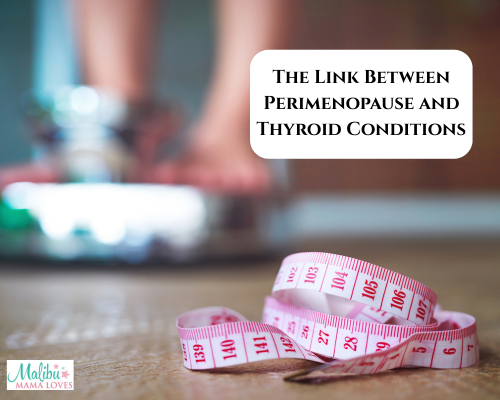The Link Between Perimenopause and Thyroid Conditions
Perimenopause is the transitional phase leading up to menopause, typically occurring in women in their 40s or early 50s (mine started at 44). During this time, hormonal changes—especially fluctuations in estrogen and progesterone—can lead to a variety of physical and emotional symptoms that can leave you feeling like you are crazy and hopeless.
While many of these changes are expected, what some women may not realize is that perimenopause can also impact thyroid health, especially for those already dealing with thyroid conditions. As I have shared before, I was diagnosed with Hypothyroidism the year before my perimenopause started… talk about fun times!!
Understanding the connection between perimenopause and thyroid health was key to my managing symptoms and maintaining overall well-being. Here is what I have discovered.
Hormonal Shifts and Thyroid Function
The thyroid is a butterfly-shaped gland located in the neck that produces hormones regulating metabolism, energy levels, and other bodily functions.
During perimenopause, the body undergoes significant hormonal changes, with estrogen levels fluctuating and eventually decreasing as a woman nears menopause. Estrogen plays a crucial role in the production of thyroid-binding globulin (TBG), a protein that binds to these hormones in the bloodstream allowing our cells to read and understand the thyroid’s instructions.
When estrogen levels rise, as they often do during perimenopause, the production of TBG increases. This can result in a higher amount of thyroid hormones being bound to proteins, making the amount of free thyroid hormones (T3 and T4) available to cells lower. As a result, women may experience symptoms of hypothyroidism, such as fatigue, weight gain, and mood swings—even if their thyroid hormone levels are technically within the normal range.
It is very complex and I highly recommend, if you are struggling with this like I have been, talking to a hormone specialist who can order the right tests and read them properly.
Worsening of Hypothyroidism Symptoms
Women who already have hypothyroidism (an underactive thyroid), like myself, may experience a worsening of their symptoms during perimenopause. My hypothyroidism escalated to Hashimoto’s during this time period.
The hormonal fluctuations can make it more difficult to maintain stable thyroid hormone levels. Additionally, many symptoms of hypothyroidism—such as fatigue, irritability, and difficulty sleeping—overlap with common signs of perimenopause, like night sweats, hot flashes, and mood swings. As a result, it can be challenging to distinguish whether these symptoms are due to thyroid issues, hormonal changes, or a combination of both.
Personally, I believe both have been affecting me so I have embarked on a journey to correct it naturally.
Impact on Treatment
Perimenopausal women with thyroid conditions may find that their thyroid medication needs adjustment. For me personally, I have no interest in taking a pill for the rest of my life. I have been working on the root cause – the function of my cells – by working to balance my hormone levels and support my bodies natural process.
Fluctuating hormone levels can affect how the body processes thyroid medication, food and vitamins – leading to the need for a higher or lower dosage. If you are taking thyroid medication, it’s important to work closely with your healthcare provider to monitor your thyroid levels and adjust your treatment plan accordingly.
I have incorporated Selenium, Moringa, a Specific blend of probiotics to help with gut health and weight loss, colostrum and a mineral and electrolyte complex that seems to really be helping. I’ll share more on it once my lab work comes back. The Moringa has been great in balancing my hormones, I have way less hot flashes and night sweats now that I have been taking it.
What You Can Do Today
The connection is complex, with hormonal fluctuations affecting thyroid function and potentially exacerbating existing thyroid conditions – like I have experienced.
If you are in perimenopause and struggling with unexplained symptoms, it’s crucial to speak with a healthcare provider who can help differentiate between thyroid issues and perimenopausal changes. With the right testing and treatment, you can better manage your thyroid health and navigate this transitional period with greater ease.
All of us girls go through it as some point, sharing what works for each of us may help someone else feel less alone through this hard process. Please share your story in the comments.
Cheers,
Malibu Mama Loves Xx



 Hi There! Let's Share ✩ Explore ✩ Awaken together! I’m a Mama, published author, biohacker, and trauma-informed life coach raising conscious kids who truly appreciate our world through travel. Welcome to the Malibu Mama Loves Conscious Living Lifestyle!
Hi There! Let's Share ✩ Explore ✩ Awaken together! I’m a Mama, published author, biohacker, and trauma-informed life coach raising conscious kids who truly appreciate our world through travel. Welcome to the Malibu Mama Loves Conscious Living Lifestyle!




 Ready To Turn Your Trauma Pain Into Purpose? Join Our FREE Masterclass Click
Ready To Turn Your Trauma Pain Into Purpose? Join Our FREE Masterclass Click 


